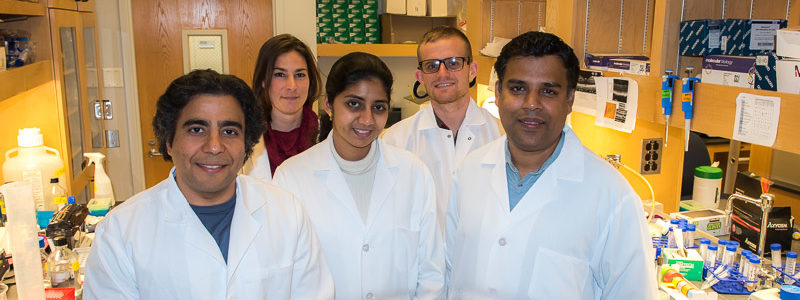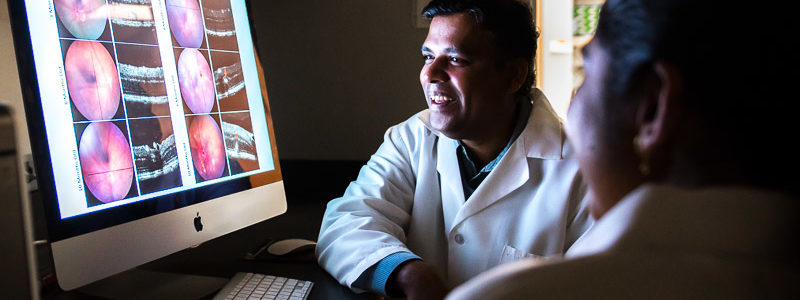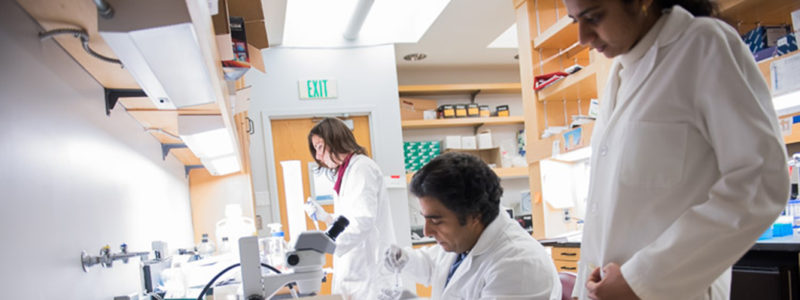The Nair Lab
Studying the genetics and biology of ocular diseases
People
Saidas Nair, PhD
Sai received his PhD in Biochemistry from the University of Mumbai, India. During his PhD, Sai studied the role of cell surface receptors in regulation of neutrophil effector functions. He was trained in Dr. Simon John’s laboratory at The Jackson Laboratory. He worked extensively on characterizing both spontaneous and chemically induced mouse mutants that recapitulate features of human glaucoma. He has identified genes contributing to glaucoma, generated new mouse models of human glaucoma and has utilized them to gain insight into the underlying pathological causes of the disease. His research utilizes a multi-disciplinary approach by integrating the use of animal models, genetics, genomics, molecular biology, cell-biology and physiology based experiments to gain mechanistic insight into disease pathogenesis.
Cassandra Labelle –Dumais, PhD
Research Scientist
Cass received her PhD from McGill University, where her research focus was in the area of Development and Reproductive biology. Her postdoctoral training was in Dr. Flores Laboratory at the Douglas Mental Health University Institute, where her work focused on understanding how perturbations in developmental molecular processes can modulate the organization of the neuronal circuitry and influence susceptibility to neurobehavioral disorders. Subsequently she joined the laboratory where she studies how genetic alterations of basement membrane components leads to diseases. In Nair lab, Cass’s major interest is to understand factors contributing to ocular growth and refractive development.
Swanand Koli, Phd
Postdoc
Swanand completed his Ph.D. from the National Institute for Research in Reproductive Health in India. During his Ph.D., Swanand has evaluated the role of retinoic acid in spermatogonial stem cell (SSC) differentiation and molecular control of c-Kit that occur during spermatogenesis. Swanand is characterizing important new animal models to study glaucoma relevant phenotypes. Swanand was recently awarded the Knight Templar Eye Foundation’s career starter grant.
Yin Zhao, Phd
Visiting Scholar
Yin is a Career Scientist in the Department of Ophthalmology, Tongji Hospital, Wuhan. His research interest includes, to identify and understand the function of retinal neural circuit in physiological and pathological conditions by employing genetic, molecular biology and optogenetics methods.
Vivian Chi
Staff Research Assistant
Gerardo Medina
Administrative Assistant
Gerardo has an extensive background in administrative and operations support in the nonprofit sector including immigration, substance abuse, legal assistance and philanthropy. He is currently seeking his MFA in Consciousness and Writing at CIIS in San Francisco. His writing emphasis is in fairy tales and fables that are inspired through his observations in nature and with his practice in yoga and the fiber arts.
Lab Alumni
- Hassan Paylakhi, PhD – Senior Scientist, Bio Marin, Bay Area, California
- Reshmi Prasad, PhD – Senior Scientist, SQZ Biotech, Boston
- Yusuf Seyman – Associate Scientist, Genentech, Bay Area, California




